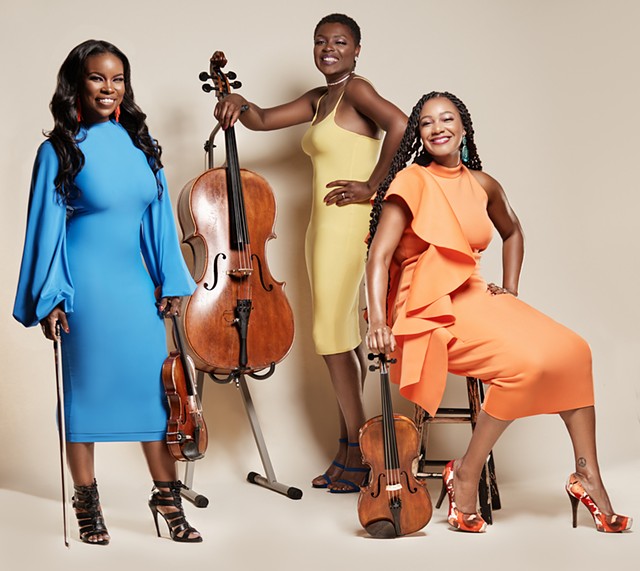
- Courtesy Of Roy Cox Photography
- The String Queens
The Washington, D.C.-based Black female trio the String Queens formed in 2017 and soon began playing for national audiences. Violinist Kendall Isadore, violist Dawn Johnson and cellist Élise Sharp performed at the 2021 Biden-Harris inaugural festivities and arranged and recorded the theme music for ESPN’s broadcasts of Wimbledon that year. They’ve played Carnegie Hall in New York City four times and headlined jazz festivals in the U.S. capital. Last year, they opened for jazz singer Diana Krall at the Hollywood Bowl in Los Angeles.
The String Queens’ next stop is New Hampshire’s Lebanon Opera House, just over the Vermont border, where they’ll perform on Thursday, April 4. At 745 seats, the venue is a slight downsize from the Bowl’s 17,500. But the String Queens plan to light up the newly renovated 100-year-old opera house with their signature blend of classical, jazz, pop, R&B and soul.
The trio tends to announce its programs from the stage, with repertoire ranging from its own contemporary arrangement of Wolfgang Amadeus Mozart’s “Eine kleine Nachtmusik” to Chick Corea’s “Spain” to “Eleanor Rigby” by the Beatles. The String Queens’ piece “Crazy/Rolling” combines “Crazy” by Gnarls Barkley and “Rolling in the Deep” by Adele.
“We’re all about pushing boundaries,” Isadore said by phone.
Education brings the String Queens to New Hampshire. As part of a residency with the opera house that will culminate in the free evening concert, they have been working via Zoom with the advanced string students of Tour Group, a youth program of the Upper Valley Music Center in Lebanon. At the concert, the students will join the trio onstage for Ludwig van Beethoven’s “Ode to Joy,” Michael Jackson’s “Billie Jean” and Johann Pachelbel’s Canon in D.
During their visit, the String Queens will also conduct a workshop, “Hip-Hoppin’ Genres,” with 10 music center faculty members.
Isadore, Johnson and Sharp, from Houston, Miami and D.C., respectively, are passionate music educators. All three began playing their instruments as children, and all have worked as school orchestra directors. Isadore currently directs enrollment at a private high school in Maryland, while Johnson is an instructional coach for elementary school arts teachers at the same D.C. charter school where Sharp is the middle school orchestra director.
Isadore said the women crossed paths separately many times before joining forces. Johnson, who studied at the Juilliard School in New York City, first met Sharp in 2003 when both were principals of their sections in the Soulful Symphony in Baltimore. Sharp and Isadore both attended D.C.’s Howard University but met later, around 2013, through wedding gigs and the DC Jazz Fest.
“[Sharp] was one of the few multi-genre musicians I knew — and one of the funkiest cellists I had ever heard,” Isadore recalled. When a wedding gig came up and a violist was needed, the two called Johnson.
For that first performance, Isadore said, “We played the same rep that everyone plays, but it sounded different. It sounded soulful.” They decided to make the trio official and met in Sharp’s classroom to decide on a name. One reason for choosing “the String Queens” was their habit of referring to their students as royalty.
The group has since put out three albums. The latest, RISE, was partially funded by a grant from the Sphinx Organization in Detroit, which helps support Black and Latino musicians.
Despite having appeared on important stages around the country, Isadore said, the trio doesn’t take its opportunities for granted. “Every time, it’s OK, we can do this. We don’t forget that we were [once] not welcome on these stages,” she noted. And when Black musicians later were welcomed, she added, they “had to entertain and then go somewhere else to use the bathroom.”
The String Queens combat racism through their music. A patriotic medley they composed, “‘Til Victory Is Won,” combines “America the Beautiful” and “Lift Every Voice and Sing,” popularly known as the Black national anthem, with “Battle Hymn of the Republic.” The first two tunes are typically heard on separate occasions, such as the Fourth of July and Juneteenth; the last gained popularity during the Civil War, when Union soldiers added lyrics honoring abolitionist John Brown.
The medley, Isadore said, “represents the country we want: united, justice-filled, freedom-filled, where we all belong.”
